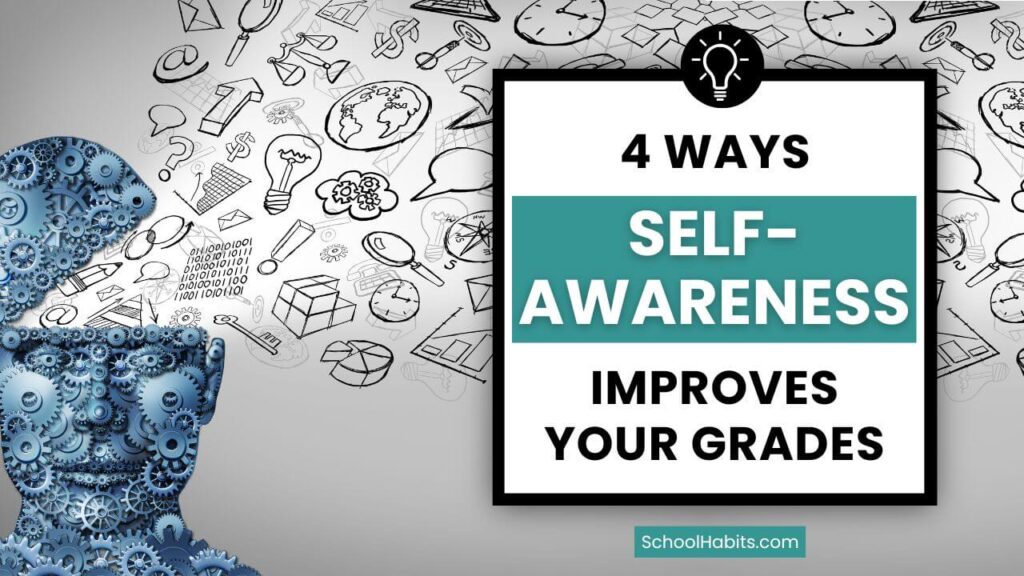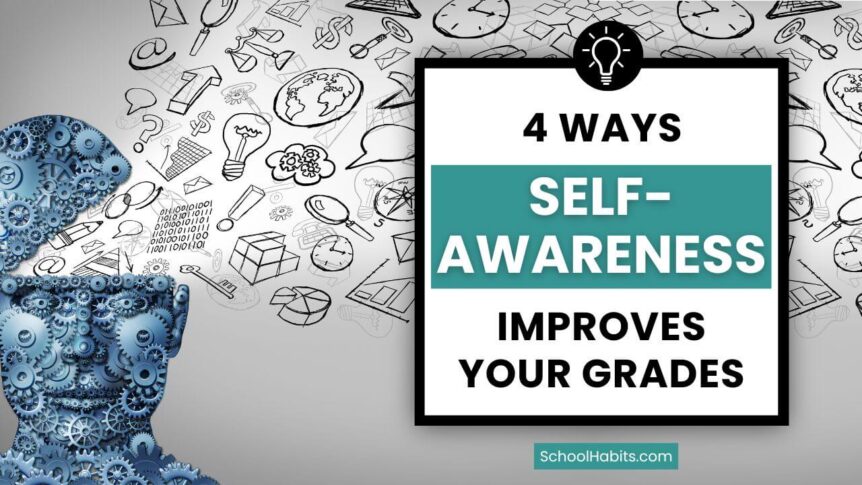
By Katie Azevedo, M.Ed.
Thriving in school takes more than raw intelligence. While it’s true that school success requires discipline, good study habits, regular attendance, and curiosity, there’s something far deeper behind it all.
And what is this mysterious “something”? Self-awareness.
Self-awareness is the single most important indicator of a student’s potential to do well in school.
In other words, we need self-awareness in order to do all the other things required to thrive in school.
Self-awareness is not a guarantee of school success, as self-awareness needs to be followed by action. But without self-awareness, it’s nearly impossible for a student to reach their academic goals.
In this blog post, I discuss four ways self-awareness improves your grades — and your entire school experience.
If you’re the type of person to roll your eyes at the concept of self-awareness, then you’re the ideal person to be reading this post.
What is Self-Awareness?
If I’m making the argument that self-awareness is the core of school success, then we should probably start by explaining what this concept is.
Self-awareness is the ability to think about and assess your own thoughts and behaviors. Sometimes it’s called metacognition, which is the ability to think about thinking. Self-awareness is our ability to monitor our inner and outer lives, including our feelings, actions, and reactions.
Here is what the Harvard Business Review has to say about self-awareness.
4 Ways Self-Awareness Improves Your Grades
Each of the following four areas has a direct impact on your grades and your overall experience in school. In other words, dialing in any of the following four areas can lead to better grades. However, the way to dial in any of these four concepts is through self-awareness.
1. Self-Awareness and Study habits
It’s no secret that better study habits lead to better grades. But without self-awareness, it’s impossible to improve your study habits.
A student who lacks self-awareness is unable to recognize when their study habits aren’t working.
A student who lacks self-awareness is unable to self-reflect and say, “Hey, I’m not learning this material. I’m not doing well on tests. What can I do to improve?”
A student who lacks self-awareness is a student who is quick to blame the test or an unfair teacher before looking at themselves.
On the other hand, a student with a sufficient level of self-awareness can recognize when their study habits aren’t working. They can recognize when their grades aren’t reflecting the effort they’re putting in. And they can assess their study habits and tweak them until they DO work.
A student with self-awareness is curious about learning effective study methods. They are Googling how to study vocabulary words, their researching how to use the Feynman Technique to study.
In this tutorial, I teach you how to tweak your study methods so they work for you. This is a helpful tutorial for students who have self-awareness. Students without self-awareness need to start a few steps earlier. Here is my student self-assessment quiz that can help you determine where your strengths and weaknesses are. link
For the ultimate way to build self-awareness, use my Executive Function Journal. I created this unique journal for the exact purpose of helping students develop the self-awareness required for executive functions and independent learning. This journal is used in home, clinical and educational settings because it’s effective.
2. Self-Awareness and Note-Taking
Self-awareness is required for a good note-taking system. In order to take strong and efficient notes during lectures, from videos, or while reading textbooks, you need self-awareness to evaluate whether your note-taking method is actually helping you learn and retain information.
For example, a student without self-awareness might write down everything they see on a lecture slide or everything their teacher says word for word, without checking to see if they understand what they’re writing down.
A student without self-awareness might feel productive when they’re taking notes, but that lack of self-awareness will make those notes unhelpful in the future.
On the other hand, a self-aware student will ask themselves:
- Do I understand what I’m writing down?
- Am I capturing the most important ideas?
- Is my note-taking process efficient
- Am I spending too much time on unnecessary details?
A self-aware student knows that the purpose of note-taking isn’t just to write things down — it’s to create a resource they can use later to study and deepen their understanding.
A student with an adequate level of self-awareness might recognize that their current notetaking system isn’t working (too many or too few details, for example). From there, they may begin to experiment with new note-taking techniques such as two-column notes, or using an outline method.
They might recognize that their notes contain too much information in full sentences, and therefore they make an effort to improve their paraphrasing and abbreviation skills.
A self-aware student can also assess the quality and efficacy of their notes after class. They ask themselves questions like:
- What did I write down that I do not understand?
- Are there any gaps in my notes that I need to fill in?
- Will these notes make sense to me in a week from now?
On the other hand, a student who lacks self-awareness might not even notice that they don’t understand what they’re writing down. They may not recognize their own inability to paraphrase and simplify textbook or teacher language. A student who acts self-awareness may only take notes to get credit. They may not fully understand that the real benefit of note-taking is their own comprehension.
3. Self-Awareness and Comprehension
Another way self-awareness improves your grades is through comprehension. There can be no learning without comprehension. And there can be no comprehension without self-awareness.
Knowledge acquisition happens when we take new material and connect it to what we already know. Every single time we learn something new, we have to connect it to something we previously learned; otherwise, that new information fades quickly.
This process requires self-awareness. In order to take something previously unknown and find a place to store it in our working memory, we have to understand it first. Students who lack self-awareness often don’t recognize when they don’t fully understand something. This means that they can never actually reach the point where they have learned the material.
This isn’t often intentional. Students who lack self-awareness often genuinely believe they understand what they’re learning. They hear something the professor says and assume they understand it without actually checking.
Or they read something in a textbook without pausing to verify if what they’re reading makes sense to them.
On the other hand, self-aware students ask themselves the following questions as they’re listening to a lecture or reading from a textbook:
- Does this make sense to me?
- Do I understand what I’m hearing?
- Do I understand what I’m reading?
- Can I put this in my own words?
- Can I explain this succinctly to someone else?
- Can I give an example of what I’m learning?
To go one step further, students with sufficient self-awareness don’t shy away from the answers to the previous questions. If they answer no to any of them, they do something to improve their comprehension.
Additionally, they are using self-check methods to assess their comprehension and recognize when they zone out.
On the other hand, students with weaker self-awareness will often read multiple pages in a book without even knowing they zoned out.
4. Self-Awareness and Time Management
Time management requires self-awareness. Too often, I see students fall for the myth that time management is a feeling. I hear things like “I feel busy” or vague statements like “I’ll get that done later.”
Self-aware students understand that time management starts with basic math. These students are using a calendar to make time visible. They are not afraid to face the reality of where their time is going and how they’re choosing to spend it.
Students with self-awareness know exactly what commitments they are responsible for and how much time they have each day to dedicate to those commitments. If those commitments don’t fit into their calendar, they have the self-awareness to make adjustments.
On the other hand, students who lack self-awareness procrastinate without knowing they’re doing it. Or they procrastinate and convince themselves they’re actually being productive. They may have no idea where their time went – when in reality, they spent four hours on their phone. They’re not being deceitful about how they’re spending their time; they’re genuinely unaware of it.
How Self-Awareness Improves Your Grades: Final Notes
I understand the concept of self-awareness may seem vague and abstract. In a way, it is. But self-awareness is a skill, and like any skill, we can get better at it.
How do we get better at self-awareness? Usually, this involves a three-step process:
- Pausing
- Asking ourselves questions
- Doing something with the answers we generate
This is the exact approach I built into the Executive Function Journal system.
Again, self-awareness must happen before comprehension. Comprehension must happen before learning. And learning must happen before good grades.
Curious about what ELSE might be contributing to school struggles? Here are 7 invisible traps that make school way harder than it needs to be.

